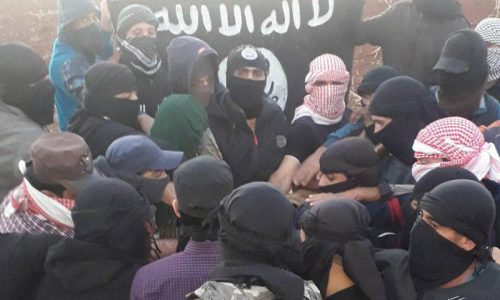
The Islamic State returns to Hauran with operations and allegiance pledges
The so-called Islamic State (ISIS) has returned to Daraa in southern Syria, more than a year after the end of its influence, through a military operation in the governorate. Fighters are said to have pledged allegiance to the new leader of the group, Abu Ibrahim al-Hashimi, who has been chosen as the successor of former leader Abu Bakr al-Baghdadi.
Since the loss of its influence in southern Syria in August 2018, ISIS’s presence has been limited to underground cells carrying out operations that it has claimed responsibility through its official media. The group’s activities have progressively increased in the region, especially after the killing of its leader and senior leaders and the decline of its influence in Syria and Iraq.
A Telegram apublication by ISIS’s Amaq News Agency, seen by Enab Baladi on November 5, includes photos showing an allegiance pledge by ISIS fighters, in what the group calls the “Wilayat of Hauran” in southern Syria, to the new leader al-Hashimi, following the death of former leader Abu Bakr al-Baghdadi in a US landing operation in northern Syria, on October 26.
The photos showed masked fighters and included a comment by Amaq that they represent, “a part of the allegiance pledge by the soldiers of the caliphate of the Leader of the Believers, the Mujahid Sheikh Abu Ibrahim al-Hashimi al-Qurashi.”
ISIS carried out operations against Syrian regime forces in several areas of Daraa in the past two weeks, the most recent of which was the attack on an overnight bus of the regime forces in the town of Rakham, in Daraa countryside.
“Soldiers of the Caliphate detonated two explosive devices against a bus carrying members of the regime army near the town of Rakham, damaging the bus and injuring all those on board,” according to a statement on ISIS’s Amaq, November 9, via Telegram.
Before this operation, ISIS announced the killing of the head of the State Security Detachment of the regime forces in the city of Inkhil in Daraa countryside, Major Mohammed Aqel Jabbour, according to Amaq, which added on November 5 that ISIS fighters killed the official in Inkhil with a gun.
Firas al-Ahmad, a correspondent for the pro-regime TV channel Sama in Daraa, said at the time on Facebook that Jabbour, a security force officer, was shot dead by unidentified gunmen in the city of Inkhil, while “he was carrying out his national duties.”
On the same day, the group announced the killing of a member of Hezbollah, a Lebanese militant force that is allied to the regime, in the town of Muzayrib in Daraa countryside, with a gun, according to Amaq.
Between July and August 2018, Daraa Governorate witnessed escalating assassinations and operations since the withdrawal of the opposition factions and ISIS from the region. These operations have been intensified during the current year with ISIS’s claiming some of these operations.
The group continued its operations in areas of its presence, especially in Syria, after confirming the killing of al-Baghdadi and the nomination of the new leader, on 31 October. It vowed in an audio recording mourning al-Baghdadi with a “worse” era, followed by photos published by ISIS’s Amaq, showing masked fighters in a number of Syrian areas pledging allegiance to al-Hashimi.
In August 2018, Syrian regime forces took control of the Yarmouk Basin area west of Daraa, the last stronghold of ISIS, through a military campaign with the participation of opposition factions that joined the settlement with the regime under Russian auspices.
The operation ended with the surrender of ISIS fighters to the regime forces and the “settlement groups,” and the transfer of these fighters to the Badia of Sweida. The regime had thus announced its full control over Daraa Governorate and deployed security points all along the Jordanian borders adjacent to the occupied Golan.
Source: Enabbaladi





